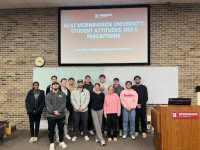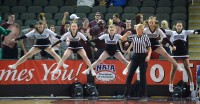 By Hannah Hecht–On October 23, Morningside College President John Reynders held a briefing with the student body. The event, “Go Inside M’side,” takes place every year after the October board of director meetings. The briefing gives students across campus the chance to speak with President Reynders, Dean and Vice President of Academic Affairs Bill Deeds, and Vice President for Student Services and Admissions Terri Curry on a host of topics.
By Hannah Hecht–On October 23, Morningside College President John Reynders held a briefing with the student body. The event, “Go Inside M’side,” takes place every year after the October board of director meetings. The briefing gives students across campus the chance to speak with President Reynders, Dean and Vice President of Academic Affairs Bill Deeds, and Vice President for Student Services and Admissions Terri Curry on a host of topics.
Reynders began the meeting by talking about the renovations and additions that are taking place across campus as part of the Vision 2020 campaign. He began by praising the renovation of Eppley Auditorium.
Then he explained that the next major priority in the campaign is the new Academic Village. The Academic Village will be finished in October of 2014, with classes starting in the spring semester of 2015. It will be home to the new advising center, which will “revamp the whole notion of first-year advising.” It will also be home to the college’s nursing, education, and new applied agriculture and food studies departments.
“I have never been as excited about a new program as I am for the applied agriculture and food studies program,” Reynders said. He called it an “industry that is central and critically important to the Midwest.” The program will begin next fall.
He went on to say that work will begin on the HJF Learning Center in two weeks. The wall closest to the Buhler Outdoor Performance Center will be coming off and a glass extension will connect the Learning Center to one of the new buildings.
“The renovation will be noisy,” he said, “But, the workers promise that after 5 pm, the library will be quiet again, so it shouldn’t affect too much of your studying.”
The “third priority” of the Vision 2020 campaign, after the renovation of Eppley and the construction of the Academic Village, is a $12 million renovation of Dimmitt Hall. The soonest that the renovation can take place is the summer of 2015. The renovation will install elevators, air conditioning, and new windows throughout the building. The renovation will also include a lot of work on the building’s electrical and plumbing systems.
“Living in Dimmitt, you’re going to feel a whole lot better, but you may not see it,” said Reynders. “There’s not much glitz and glamour. Also, we’re going to do everything we can to accommodate folks with disabilities.”
Reynders acknowledged that one of the larger issues that students have with the campus is a lack of parking. The lots of the three demolished houses will be paved over and turned into parking within the next two weeks.
He also talked briefly about the Higher Learning Commission’s upcoming visit in the spring, his excitement about next year’s addition of an intercollegiate men’s volleyball team, and the expansion of the Morningside Outdoor Band into a marching band.
After his speech, President Reynders opened up the floor to questions from the audience.
Students asked questions on a range of topics, from internet bandwidth, to the interdepartmental honors program, to environmental issues.
The first question came from Michael Stern. He asked what the Learning Center is going to look like after the renovations.
Deeds responded that there will be a new glass face on the side facing the walkway, the second floor will become more spacious as books are moved up to the third, and many books (ones that haven’t been checked out in upward of fifty years) will be donated to charitable organizations.
Jack O’Brien then asked, “Will there be an expansion of tech services and internet services alongside the physical expansion of buildings?”
The administrators responded that the college increases the internet bandwidth every year, and within seconds, the bandwidth fills up. With the start of the school year, the technology services department also added a new position for an Apple expert. This allows tech services to do a lot of repairs here at the school, instead of having to send the computers somewhere else.
Jazmine Dirks asked why the upperclassmen honors sections have been reduced to two. Deeds answered that the level of interest has been on a steady decrease. Another student asked about environmental impact of the construction. Reynders replied that the campus has added a new part-time position of environmental sustainability consultant. All of the new buildings will have silver status in LEED (Leadership in Energy and Environmental Design) certification.
Many students expressed the concern that with the addition of new programs and improvement of old programs the campus may exceed capacity. However, all three administrators explained that the college is on a very slow growth plan and we will top out around 1400 students, which is still under our capacity.
Although residence halls may seem full, they said, there are many single rooms that should be doubles. Also, students need to keep in mind that the college decides the number of students admitted each year.





Leave a Reply